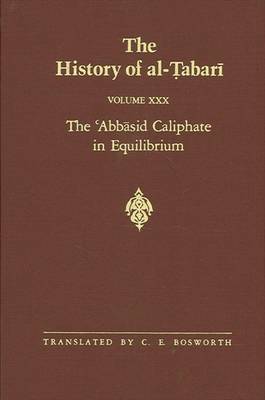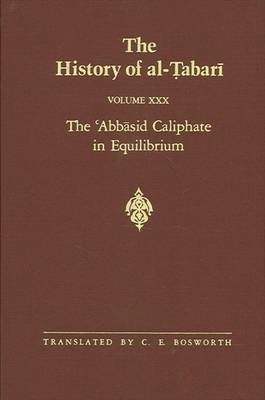
- Retrait gratuit dans votre magasin Club
- 7.000.000 titres dans notre catalogue
- Payer en toute sécurité
- Toujours un magasin près de chez vous
- Retrait gratuit dans votre magasin Club
- 7.000.0000 titres dans notre catalogue
- Payer en toute sécurité
- Toujours un magasin près de chez vous
The History of al-Ṭabarī Vol. 30
The ʿAbbāsid Caliphate in Equilibrium: The Caliphates of Mūsā al-Hādī and Hārūn al-Rashīd A.D. 785-809/A.H. 169-193
Description
This volume of al-Ṭabarī's History covers nearly a quarter of a century, and after covering the very brief caliphate of al-Hādī, concentrates on that of Hārūn al-Rashīd. During these years, the caliphate was in a state of balance with its external foes; the great enemy, Christian Byzantium, was regarded with respect by the Muslims, and the two great powers of the Near East treated each other essentially as equals, while the Caucasian and Central Asian frontiers were held against pressure from the Turkish peoples of Inner Eurasia. The main stresses were internal, including Shī'ite risings on behalf of the excluded house of 'Alī, and revolts by the radical equalitarian Khārijites; but none of these was serious enough to affect the basic stability of the caliphate.
Hārūn ar-Rashīd's caliphate has acquired in the West, under the influence of a misleading picture from the Arabian Nights, a glowing image as a golden age of Islamic culture and letters stemming from the Caliph's patronage of the exponents of these arts and sciences. In light of the picture of the Caliph which emerges from al-Ṭabarī's pages, however, this image seems to be distinctly exaggerated. Al-Rashīd himself does not exhibit any notable signs of administrative competence, military leadership or intellectual interests beyond those which convention demanded of a ruler. For much of his reign, he left the business of government to the capable viziers of the Barmakīd family-the account of whose spectacular fall from power forms one of the most dramatic features of al-Ṭabarī's narratives here-and his decision to divide the Islamic empire after his death between his sons was to lead subsequently to a disastrous civil war. Nevertheless, al-Ṭabarī's story is full of interesting sidelights on the lives of those involved in the court circle of the time and on the motivations which impelled medieval Muslims to seek precarious careers there.
A discounted price is available when purchasing the entire 39-volume History of al-Ṭabarī set. Contact SUNY Press for more information.
Spécifications
Parties prenantes
- Traducteur(s):
- Editeur:
Contenu
- Nombre de pages :
- 394
- Langue:
- Anglais
- Collection :
Caractéristiques
- EAN:
- 9780887065668
- Date de parution :
- 13-06-89
- Format:
- Livre broché
- Format numérique:
- Trade paperback (VS)
- Dimensions :
- 151 mm x 230 mm
- Poids :
- 530 g

Les avis
Nous publions uniquement les avis qui respectent les conditions requises. Consultez nos conditions pour les avis.





